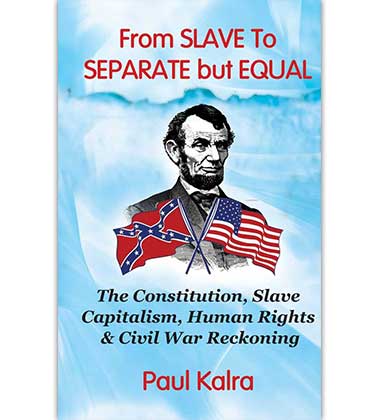From Slave to Separate but Equal
The Constitution, Slave Capitalism, Human Rights & Civil War Reckoning
Author- Paul Karla
From Slave to Separate but Equal: The Constitution, Slave Capitalism, Human Rights & Civil War Reckoning is a secret history of the United States, not taught in schools, about Economic, Social and Political effects of Protestant slavery.
included in the Constitution, denying citizenship to Blacks resulting in a Civil War reckoning with a million casualties.
From Slave to Separate but Equal challenges the assumption that the Civil War was fought to end black slavery.
Author Paul Kalra presents a convincing argument that by far the bloodiest war the U.S. has waged could have been avoided had slaveholders adopted the Catholic slave code, which recognized the humanity of slaves.
By adopting the Protestant slave code and framing it into an undemocratic Constitution, slaveholders created distinct slaveholder and non-slaveholder classes, and denied Blacks citizenship.
This inevitably led to economic and political dilemmas that became insurmountable once immigrants flooded the slave-free North and Lincoln was elected President.
We provide answers to frequently asked questions: instagram.com/hotus99
- Faq1: Black and White Slavery Comparison. Why?
- Faq2: Why were Blacks denied citizenship in Constitution?
- Faq3: Why was Jefferson’s daughter sold as a slave?
- Faq4: Why was George Washington breeding Negroes?
- Faq5: What was Lincoln’s solution for Negro problem?
- Faq6: What was Douglas’s Black, Civil War point of view?
- Faq7: George Mason on Perils of Slavery in Constitution. Why?
- Faq8: Alexander Hamilton on Perils of Constitutional Democracy. Why?
- Faq9: Why were Blacks guilty unless proven innocent?
What others are saying about this book:
- Your project is intriguing and original and provocative. —Harold Holzer, Chairman, The Lincoln Bicentennial Foundation
- Your thesis is fascinating and the evidence you marshal is persuasive. I have never seen the subject of race relations or slavery approached in quite this way before.—Ellis Cose, editor and columnist for Newsweek and author of The Envy of the World: On Being a Black Man in America
- A unique perspective. If this book represented self-evident truths and only the most obvious conclusions, it would hardly be worth reading. —John Y. Simon, author of House Divided: Lincoln and His Father
- A fascinating psychological analysis of slavery and its consequences. It provides readerswith an understanding of the dilemmas of northern as well as southern forms of racism. —Kenneth B. Clark, Psychologist (Supreme Court’s 1954 Brown vs Board of Education Decision)
- A very persuasive case for the unique character of American (Protestant) slavery and its implications for the status of American blacks right down to the twentieth century. —Stanley M. Elkins, History Professor and author of Slavery a Problem in American Institutional and Intellectual Life
- Literally could not put it down. Your thesis is good and the supporting scholarship excellent. A most impressive manuscript. —Charles B. Strozier, Editor of Psychohistory Review and author of Lincoln’s Quest for Union: Public and Private Meanings






